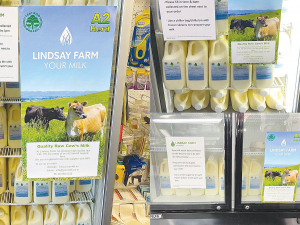Editorial: Happy days
OPINION: The year has started positively for New Zealand dairy farmers and things are likely to get better.
 Registered provider of raw milk, Lindsay Farm is recalling product after the detection of Campylobacter. Photo: Facebook
Registered provider of raw milk, Lindsay Farm is recalling product after the detection of Campylobacter. Photo: Facebook
Raw unpasteurised drinking milk from Central Hawke's Bay producers Lindsay Farm is being recalled following the detection of Campylobacter.
The Ministry of Primary Industries says Lindsay Farm is a registered provider of raw milk.
The recall affects Lindsay Farm brand drinking milk, sold in the Hawke's Bay region at eight registered depots and via home deliveries. The product is sold in 2-litre plastic bottles.
Campylobacter bacteria can cause severe gastroinstestinal illness in people, and can be particularly serious in young people, the elderly, pregnant women and people with weakened immune systems.
New Zealand Food Safety's national food compliance services manager, Melinda Sando, says people with Lindsay Farm organic raw drinking milk at home should check if it is among the batches of recalled product.
"If you have any of the recalled product, throw it out or return it to your supplier, or heat to 70°C and hold at this temperature for one minute. If you don't have a thermometer, heat the milk until it nearly reaches a boil (or scald the milk) before drinking it.
"Raw milk is inherently more risky than pasteurised milk because the process of pasteurisation kills harmful bacteria. You can get sick from consuming raw milk. If you have health concerns after drinking the product, seek medical advice."
Campylobacter symptoms include muscle pain, headache and fever followed by watery or bloody diarrhoea, stomach pain and nausea. Symptoms typically develop 2 to 5 days after infection and last 3 to 7 days.
In people with weakened immune systems, such as those with a blood disorder, with AIDS, or receiving chemotherapy, Campylobacter occasionally spreads to the bloodstream and causes a life-threatening infection.
Human campylobacteriosis is a notifiable disease in New Zealand. That means any cases must be reported to public health authorities.
Additional reductions to costs for forest owners in the Emissions Trading Scheme Registry (ETS) have been announced by the Government.
Animal welfare is of paramount importance to New Zealand's dairy industry, with consumers increasingly interested in how food is produced, not just the quality of the final product.
Agriculture and Forestry Minister Todd McClay is encouraging farmers and growers to stay up to date with weather warnings and seek support should they need it.
The closure of SH2 Waioweka Gorge could result in significant delays and additional costs for freight customers around the Upper North Island, says Transporting New Zealand.
OPINION: The year has started positively for New Zealand dairy farmers and things are likely to get better.
Ministry for Primary Industries (MPI) Director General Ray Smith believes there is potential for an increase in dairy farming in New Zealand.
OPINION: There will be no cows at Europe's largest agricultural show in Paris this year for the first time ever…
OPINION: Canterbury grows most of the country's wheat, barley and oat crops. But persistently low wheat prices, coupled with a…